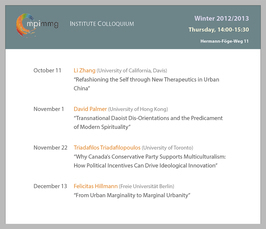"Transnational Daoist Dis-Orientations and the Predicament of Modern Spirituality"
Institute Colloquium Winter 2012/13
- Datum: 01.11.2012
- Uhrzeit: 14:00 - 15:30
- Vortragender: David A. Palmer (University of Hong Kong)
- Dr. David A. Palmer is Assistant Professor in the Department of Sociology at Hong Kong University. Before joining the HKU in 2008, he held appointments as the Eileen Barker Fellow in Religion and Contemporary Society at the London School of Economics and Political Science, and as a research fellow at the Ecole Française d‘Extrême-Orient (French School of Asian Studies), where he was the director of its Hong Kong centre, located at the Institute of Chinese Studies of the Chinese University of Hong Kong, from 2004 to 2008.
- Ort: MPI-MMG, Hermann-Föge-Weg 11, Göttingen
- Raum: Library Hall

For more details please contact buethe(at)mmg.mpg.de.
This lecture, building on a study of encounters between Chinese Daoist monks and Western spiritual tourists at Huashan, considers the formation of “spiritual subjects” in the Chinese and Western context, with attention to historical trajectories and modern transformations. Building on ethnographic research on the encounters at Huashan and the spiritual biographies of the main actors, the lecture will bring two bodies of scholarship into dialogue: the history and anthropology of Chinese Daoism on the one hand, and Western social theory on the self, the body and spirituality. This dialogue provides some insights into the possibilities and dilemmas facing Daoism as it is reconstructed as a modern, globalized spiritual path. I argue that American Daoism, with its emphasis on the body, subjective experience, and self-fulfilment, is a recent expression, and perhaps the fullest consummation, of a long history of spiritual individualism in the West, tending toward the complete disembedding of religious practice from place, tradition, and collective identity. Daoist self-cultivation may appear to Western practitioners as the ideal, Oriental expression of this spiritual individualization – but, in China, it has historically tended to express a tendency toward, and not away from, deep embedding in locality, tradition, and Chinese national identity. The transnational encounters at Huashan reveal the impasse which threatens both trajectories today, in a condition of high modernity: the fragility of a fully autonomous spiritual self on the one hand, and the crumbling away of the traditional ground of Chinese Daoism on the other.